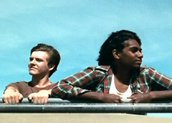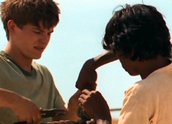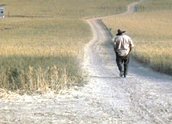


September (2007)
Synopsis
Ed Anderson (Xavier Samuel) and Paddy Parker (Clarence John Ryan) are best friends, growing up on a farm in the West Australian wheat belt in 1968. Ed’s father Rick (Kieran Darcy-Smith) runs the farm with the help of Paddy and his father Michael (Kelton Pell), who has been friends with Rick since childhood. The Andersons are white, the Parkers are Aboriginal. Like most employers of black labour, Rick Anderson provides food and a basic house for Michael Parker and his wife Leena (Lisa Flanagan), rather than wages. The two families are mutually dependant, but this is about to change: the government has announced that all Aboriginal labour must be paid wages. When Michael inquires about this, Rick tells him that he can’t afford it: if he pays wages, he’ll also have to charge rent. The close friendship between the two sons also changes when Ed meets a girl, his new neighbour Amelia Hamilton (Mia Wasikowska). Paddy wants to become like his idol Lionel Rose, the best new boxer in Australia. As his friendship with Ed breaks apart, Paddy decides his future is elsewhere.
Curator’s notes
September is an engrossing film about a subject that few films have tackled – the economic co-dependency between blacks and whites in Australia. It may sound more like a subject for a thesis, but Peter Carstairs makes it intensely dramatic and personal through the story of a friendship. Carstairs grew up in Western Australia and his short films displayed an affinity with stories from a farming background.
September, co-written with Ant Horn, was developed with assistance from the Tropfest Feature Project, an initiative which awards $1million toward the budget of one feature film annually. The film was shot in 25 days but it shows no signs of being rushed. Indeed, it’s one of the most assured feature debuts of the last few years, partly because of the way Carstairs controls the rhythms. He uses repetition to suggest that things have remained the same in this place for a long time. He uses the stark and treeless fields of wheat to give a sense that the land has been worked hard for generations. At the same time, the whole basis of the film is that nothing stays the same – neither in friendships, nor the attitudes of a wider society.
The issue of Aboriginal wages may have seemed a straightforward matter of social justice to some Australians in 1968, but the film makes clear that it was far from simple for those on the ground. The Parker family are faced with a terrible new reality – they can stay and work without pay, but with a roof and basic sustenance, or they can go to town to live, where there is no guarantee of either. There is little dignity possible in either choice.
The inequalities between the two families are clear in every scene, but Carstairs doesn’t labour them. The differences can simply be read in the background, as we see the two young boys in the foreground behaving as equals. Paddy works on the farm, Ed still goes to school; the houses are different, and one family doesn’t have enough to eat; the white farmer decides what the black farmer can have in stores, and he frowns on the use of tobacco. One family controls all resources, including transport, the other family’s labour helps pay for it, but without a share in the profits. Everything is compounded by the fact that there are no profits at this point, which leaves the white farmer, even one as sympathetic as Rick, in a terrible bind. He needs labour to help run the farm but he can’t afford to pay for it. The idea of co-dependency between black and white in Australia is not new in our movies – indeed, it’s one of the themes of Charles Chauvel’s seminal film Jedda (1955) – but it has seldom been expressed so well as an economic argument, rather than simply an emotional one.
- Overview
- Curator’s notes
- Video 3 clips
- Principal credits
- Find a copy
- Make a comment
- Map
- Add your review



